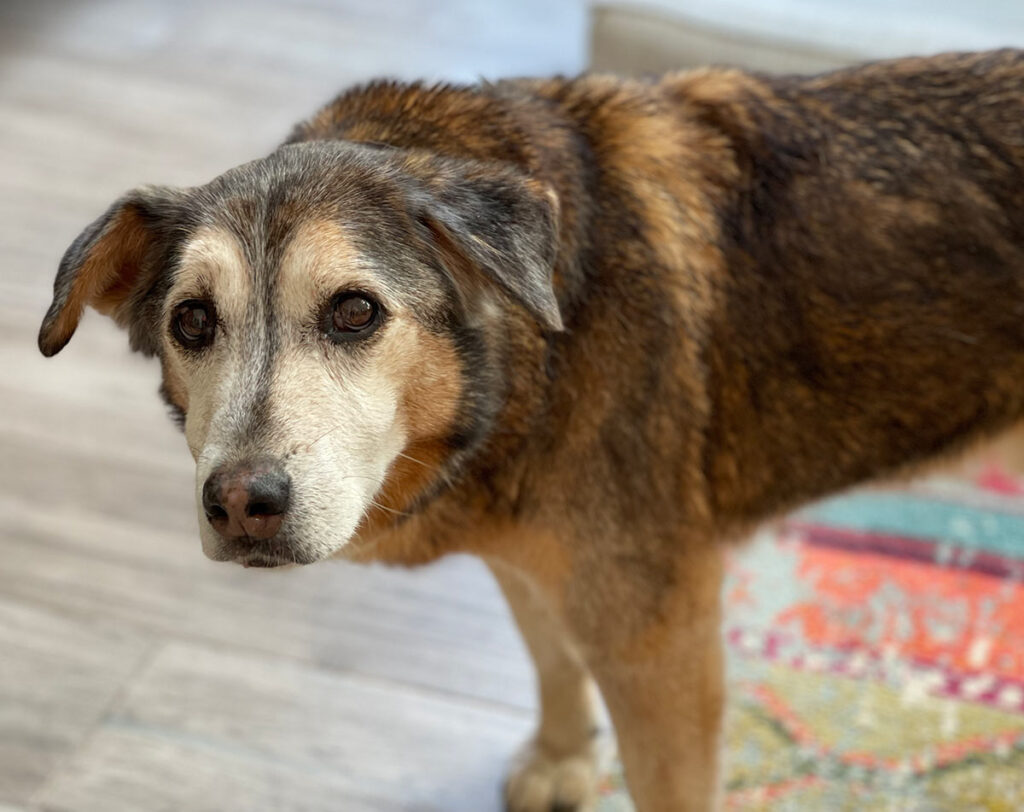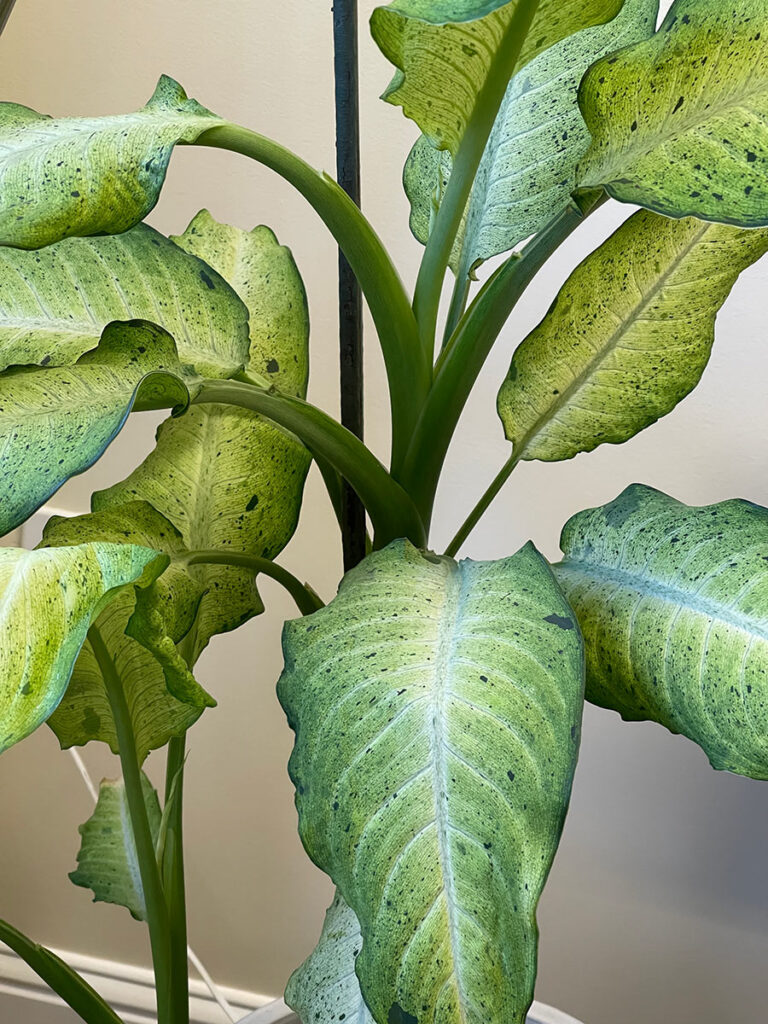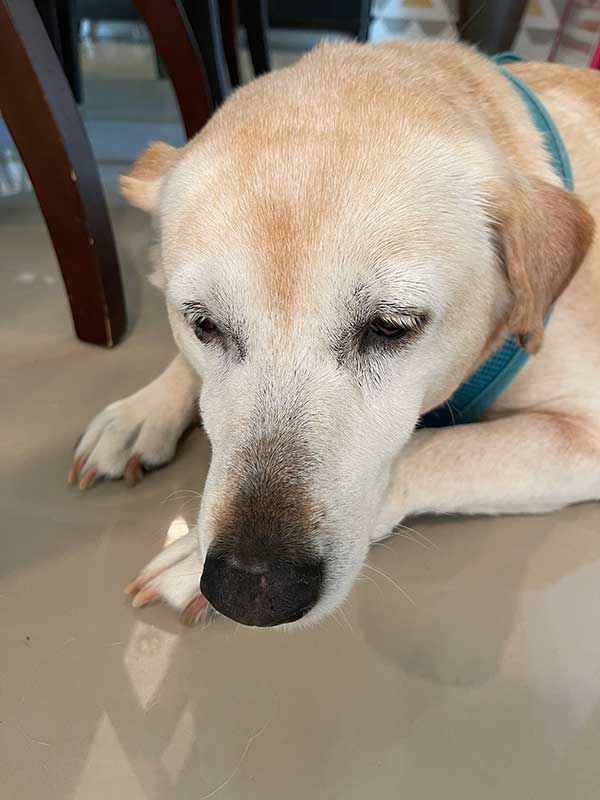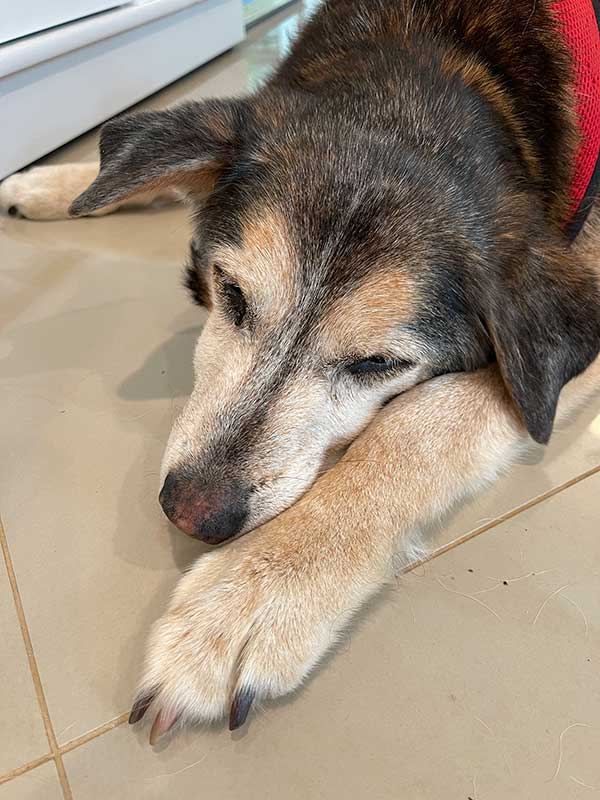I stepped out of the house for just 30 minutes.
That’s all the time it took for my 14-year-old mixed-breed dog, Charlie, to chew on not one, but two, plants that are toxic to dogs.
Charlie had chewed on a plant only once before – in 2017 when I first adopted him. It was a papyrus plant and it is not poisonous to dogs.
I knew that some of my indoor plants were toxic to dogs, so after this incident, I kept my house plants out of the reach of my dogs for years.
But after four years of Charlie ignoring my indoor plants, I started putting them closer to the floor where he might be able to reach them. I mean, what was the harm?

My Dog Ate A Leaf from a Dumb Cane Plant (Dieffenbachia) and Part of a Snake Plant (Dracaena trifasciata)
My dog Charlie chewed a big chunk out of my large variegated dumb cane plant. Dumb cane or Dieffenbachia contains calcium oxalates and proteolytic enzymes. These two materials can cause irritation and burning of the mouth and lips, drooling, vomiting, and problems swallowing. Yikes!
Then he went downstairs and ripped up some snake plant and chewed on that. Snake plants or Dracaena trifasciata (formerly Sansevieria trfasciata) contain saponins which are toxic chemicals plants use to ward off predators. These can cause nausea, vomiting, and diarrhea.
Even worse, he vomited, and then our other dog Luna (a yellow lab mix) may have eaten the vomit. So both dogs had ingested poisonous plant material.

What to Do if Your Dog Eats a Poisonous Plant
The first thing to do if you suspect your dog ate a toxic plant is to call your vet. Your vet is familiar with your dog’s health and can give you advice on what to do.
The ASPCA (American Society for the Prevention of Cruelty to Animals) also has an Animal Poison Control Center (APCC) that is available 24 hours-a-day. The number is (888) 426-4435. There may be a fee for assistance.
It was 11:35 a.m. and our veterinarian’s office closes at noon on a Saturday. I quickly made a call to them and explained what had happened. They told me to hurry in.
Both of our dogs are over 14 years in age and have pre-existing health issues, so we knew we needed to make sure they didn’t suffer after ingesting my two toxic house plants.
The vet gave them medicine to induce vomiting and they both got IV fluids.
Our poor dogs were exhausted and miserable when we got to take them home. Charlie could barely stand up and Luna spent all day in bed.
It took them about a day and a half to recover from their experience. I felt so bad for them.
But we were lucky. They both recovered and did not experience any negative side effects from ingesting the plant pieces. We got them to the vet in time.


Why Is My Dog Eating My House Plants?
Dogs eat plants. It’s just something they do as a part of their everyday life.
In 2008, researchers from the University of California published a survey of 1,571 pet owners and found that 68% of them said their dogs ate plants weekly or daily (see their research abstract).
Only 9% of the dogs that ate plants appeared to be ill before eating the plant; only 22% of the pet owners said that their dogs vomited after eating the plants. The researchers concluded that “plant eating is a normal behavior of domestic dogs.” (2008, Sueda, Hart, and Cliff)
In Charlie’s case, he was licking his bed first, which often means his stomach is upset. He has a pattern of licking his bed obsessively and then when we put him outside, rushing to eat the first grass he sees. Unfortunately, I only remembered him licking his bed that day in hindsight.
My guess is that Charlie ate my house plants to try to feel better. If we had put him outdoors he would have eaten grass. In his desperation, he chewed one what was available – dumb cane and snake plant.
How To Keep Your Dog From Eating Your House Plants
Dog owners, I’m asking you to learn from my mistake. Don’t put ANY indoor plants where your dogs can reach them.
Even if your dog has never shown interest in your house plants, please, please make sure your indoor plants are out of reach of your dog.
Better yet, don’t keep any indoor plants that are toxic to dogs in your house. It’s better to be safe than sorry.
I have moved my dumb cane plant into my office and removed all plants from the basement where the dogs sleep at night.
I love having a house full of plants, but I will not risk the health of my sweet dogs again. Lesson learned.
